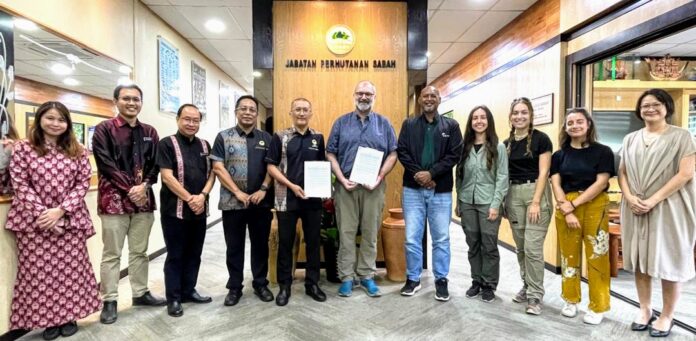Indra Sunjoto, Deputy Chief of Forests (Planning & Management), representing the Chief Conservator of Forests and Prof. Alain Rival, CIRAD Senior Project Manager, posing with the signed LoI by both parties, together with other officials at the handing over ceremony.
SANDAKAN : – The Sabah Forestry Department (SFD) and the French Agricultural Research Centre for International Development (CIRAD) have signed a Letter of Intent (LoI) to formalise a collaborative partnership on TRAILS 2, a long-term agroforestry research initiative aimed at transforming oil palm landscapes to support both biodiversity and sustainable productivity.
TRAILS 2, short for Agroforestry Plantations for Biodiversity and Ecosystem Services, represents an ambitious step toward reconciling environmental conservation with agricultural development.
The project seeks to assess innovative oil palm-based agroforestry systems that integrate native tree species, improve ecological connectivity, and deliver critical ecosystem services such as soil fertility, microclimate regulation, and habitat provision for wildlife.
The study site is at Melangking Oil Palm Plantation in Sukau, where the company has set aside some 100 ha for this biodiversity research.
The LoI, signed at SFD Headquarters in Sandakan, reflects a shared commitment to addressing pressing global challenges—deforestation, biodiversity loss, and climate change—through science-based approaches tailored to tropical ecosystems.
It also paves the way for more resilient land management practices in the face of increasingly unsustainable monoculture plantation models.
As part of the collaboration, SFD will facilitate coordination with key regulatory agencies, such as the Sabah Biodiversity Centre and the Department of Agriculture to ensure the TRAILS 2 project aligns with local and national legal frameworks.
In addition, the Forest Research Centre Sepilok, the research arm of SFD, will provide technical guidance and support in forest ecology and long-term monitoring.
In addition, CIRAD is also working with HUTAN, an NGO led by Dr Marc Ancrenaz on wildlife monitoring.
Datuk Frederick Kugan, Chief Conservator of Forests, represented by Indra Sunjoto, Deputy Chief Conservator of Forests (Planning and Management), stated:
“This partnership with CIRAD reinforces Sabah’s leadership in sustainable forestry.
TRAILS 2 opens new opportunities to demonstrate that oil palm production and biodiversity conservation can co-exist through thoughtful land-use innovation.”
Professor Alain Rival, representing Dr Jean Marc Roda, the CIRAD Regional Director for Southeast Asian Island Countries, commented:
“With TRAILS 2, we want to move beyond debate and put our R and D partnership into action.
Long-term field experiments and accurate monitoring are essential to build scientific evidence for sustainable agroforestry, especially in complex landscapes such as Sabah”.”
The research will explore multiple agroforestry configurations—from interplanted native tree rows to forest islands embedded within plantations—while monitoring their effects on biodiversity, ecosystem services, and palm productivity.
Findings from TRAILS 2 are expected to provide robust data to guide growers, policymakers, and conservationists toward regenerative oil palm-based systems.
This initiative also supports Malaysia’s broader environmental agenda and aligns with the UN Decade on Ecosystem Restoration and Sustainable Development Goals.



